- Home
- Karen Hawkins
The Book Charmer
The Book Charmer Read online
Thank you for downloading this Simon & Schuster ebook.
* * *
Get a FREE ebook when you join our mailing list. Plus, get updates on new releases, deals, recommended reads, and more from Simon & Schuster. Click below to sign up and see terms and conditions.
CLICK HERE TO SIGN UP
Already a subscriber? Provide your email again so we can register this ebook and send you more of what you like to read. You will continue to receive exclusive offers in your inbox.
To Cap’n Hot Cop, who sat with me on a snowy day in front of a roaring fire in the music room of Blantyre, a romantic Gilded Age mansion in the Berkshires, debating plot points for The Book Charmer, the book of my heart.
Nate, you are my magic.
PROLOGUE
Sarah
DOVE POND, NC
JULY 21, 2001
On the Saturday after her seventh birthday, a book spoke to Sarah May Dove. If she’d been older, she might have been surprised or even shocked, but as she was only seven and still a stubborn and devoted believer in Santa Claus, the Tooth Fairy, and the Easter Bunny, she didn’t even blink.
In fact, after a moment’s thought, she decided that books always spoke inside the quiet of one’s head, although usually only while being read. So hearing a book speak didn’t faze her in the slightest.
Besides, she was a Dove, and everyone knew the Dove family was special. Every chance her mom got, she proudly pointed out that when the Doves had seven daughters, as they did now, good things happened to their hometown of Dove Pond.
Mom wasn’t just bragging; history had proven this true. In 1735, a seventh Dove daughter was born to the Dove family. When Jane Dove, the fourth oldest daughter, turned seven years of age, the town was suffering under a severe, crippling drought. Jane, a softhearted child who loved animals, cried at the thought of all the thirsty farm animals. As her tears fell, clouds gathered, and it began to rain. From then on, every time Jane cried, it rained. It was said that whenever local farmers wanted it to rain, they would bring Jane onions. And when they wanted sunshine, they brought her cake.
In 1829, another seventh daughter arrived. The oldest, Mary Dove, was said to have hair the color of spun gold and a propensity for finding lost jewelry, much to the delight of the townswomen. One hot summer day, while wading in the creek that wandered through town, Mary kicked over a rock and uncovered a large gold nugget. Thus began the Dove Pond gold rush. The gold rush lasted a remarkable thirty-two years, long enough to whip up a building frenzy that left behind the marble-fronted town hall, eight brand-new brick buildings on Main Street, a new school, and several streets of stately homes, all of which still stood today.
Sarah, her sisters, and her mother lived in one of those houses, a sprawling structure with so many creaks and leaks that it couldn’t keep out the smothering summer heat no matter how many window air conditioners they added. Because of this, every Saturday throughout the summer, Sarah and her sisters retreated to the deliciously cool air-conditioning in the Dove Pond Library.
Sarah loved those trips to the library. As she was the youngest by five years and had no interest in either makeup or boys, the only things her sisters cared about, she filled her days with books. Every Saturday, after their mother dropped them off, Sarah’s sisters would cluster around the fashion magazines, whispering and giggling, while she roamed the aisles alone looking for books about dragons.
Sarah wished with all her heart that dragons were real instead of existing only between the pages of certain books. Fortunately for her, there were lots of books with dragons. Although only seven, she’d been reading since she was three, a fact her mother told anyone who would listen. Sarah was a voracious reader, and she’d found friends hiding between the pages of books. For her, the trips to the library meant more than the refreshing burst of air-conditioning. They were life.
On the Saturday after her seventh birthday, ignoring her sisters’ giggles as they clustered around one of their stupid magazines, Sarah headed for the Young Adult section. She had just walked past the glass display case that contained relics explaining the history of Dove Pond, when a dusty, paper-rattled voice rang out.
Read me.
The words echoed inside her head, without true sound, yet with a presence so keen that Sarah stopped in her tracks, her gaze locked on the glass case.
A small book propped in the center of the case rustled impatiently. Read me now.
Sarah dropped her backpack on the floor and walked to the case. She placed her hands flat on the cool, smooth glass and stared at the book, an old cracked-leather journal that rested among some other early artifacts in a display about the founding of Dove Pond.
She knew this particular book, even though she’d never seen it outside of the case. It had been written in 1702 by Charlotte Dove, the seventh daughter of the founding family of Dove Pond and one of Sarah’s ancestors. Every Founder’s Day, portions of it were reprinted in the local paper. Sarah knew the oft-repeated passages well, especially the few paragraphs where fourteen-year-old Charlotte Dove described in breathtaking detail the exact moment the Dove family had crossed the crest of Black Mountain, North Carolina, to look down into the green valley below. There they’d seen a single pond glistening in the morning sun like a sapphire set on a bed of emerald velvet and had decided that here was where they’d stay.
And so Dove Pond had been born.
There’s more to the story, the book said.
“Like what?” Sarah asked.
You’ll know when you read me.
Sarah considered this. She was allowed to check out only two books at a time and they had to last her all week, so she had to be very careful which ones she picked. “You’re very small.”
I have eighty-seven pages.
Which wasn’t many, especially as it was handwritten. She could read that in a few hours. “Are there dragons?”
No. The book’s sharp irritation was evident even through the thick glass.
Sarah dropped her hands from the case. “I want a book with dragons.”
The book fluttered with irritation. Read me, it repeated sharply. You have to.
If there was one thing Sarah Dove didn’t like, it was being told what to do. With six older sisters, that happened way too often as it was. So instead of agreeing to read the book, she said, “No, thank you,” and turned to leave.
A boy she knew from school stood not four feet away, staring at her.
Blake McIntyre was a year older than Sarah. Whenever her sisters were anywhere near his older brother, Carter, who was a senior in high school, they became giggly and weird, which annoyed Sarah so much that she took it out on Blake whenever she saw him. It would have been more meaningful to take out her irritation on Carter, but he was never around. Meanwhile, she saw Blake on the bus every day, and so she teased him mercilessly.
He looked past her to the case and then back. “Who are you talking to?” Despite his bold tone, his face burned bright red.
“I’m talking to myself. Who else?”
He shifted from one foot to the other, his book bag hanging heavy on his shoulder. After an awkward moment, he said in a stiff tone, “I never talk to myself.”
She shrugged. “That’s because you wouldn’t listen.”
He scowled. “You don’t know that.”
She offered a scoffing smile, one she’d learned from her oldest sister, Madison, who seemed to instinctually know how to cut a person to the quick. “Don’t I?”
His face turned an even brighter red. After an awkward moment he muttered something under his breath, and then, with a final, confused look from her to the case and back, he left.
The book barely waited for him to leave before it hissed, Open the case. It’s not locked.
“Nope.” She scooped up her book bag from where she’d left it on the floor. “I need a book with dragons.”
You’ll be back! the book whispered angrily. Wait and see! You need me!
Sarah ignored it and headed upstairs to the Young Adult section. She was happy when she reached the books she really liked, the ones that didn’t snap at her but instead told stories of dragons and swords and girls who made things happen.
For the next month, every time Sarah returned to the library, the book fussed at her. First it would demand, then it would beg, and when that didn’t work, it would snarl and fume. Irked by the book’s insistence, Sarah started using another path to reach the stairs to the Young Adult section, avoiding the display case altogether.
As the weeks passed, Sarah discovered she could hear other books, too, although their voices were silkier and whisper-soft. They weren’t demanding like the journal, but instead tried to tempt her.
You’d enjoy reading me, a very pretty book with a red cover told her one Saturday.
She thought about that. “Do you have dragons?” she asked.
No, but there’s a unicorn on page 142.
She liked unicorns, but not as much as dragons. Sarah mentioned this to the book, and because it was much politer than the journal, the book sighed its regret. Another time, then, it said. When you’re tired of dragons.
Which would never happen. “Of course,” Sarah replied politely as she moved down the shelves.
Later that day, sitting in the back seat of the van with her book bag in her lap, Sarah asked her sister Ava, who was closest to Sarah in age, if books ever talked to her.
Ava snorted rudely. “No, but I wish plants could.” Ava was always growing something. Their backyard was filled with flowers, all because of her. Mom said Ava had a “green thumb,” which was true. Ava’s thumb, like the rest of her hands, had a faint green tint. “It’s grass stain,” Ava had said. “From working in the garden.” But Sarah didn’t believe her. They were Doves, after all.
She looked at Ava now and wondered what it would be like if flowers could talk. After thinking about it (and remembering that some plants had thorns and prickers and could cause itchy rashes), Sarah decided she’d rather have books talk to her than anything else. Well, all books except one.
When they reached home, Sarah—always the last one out of the van—waited for the screen door to bang closed behind her annoying sisters before she hefted her book bag over her shoulder and went around the porch to the backyard. No one would miss her until dinner, and she couldn’t wait to read the books she’d checked out of the library.
As she walked by the rusty swing set, she glanced to the house next door where Travis Parker lived. She and Trav had been in the same class since kindergarten, and he was her best friend. He wasn’t home this summer, as he was staying with his grandpa at his farm outside of Atlanta. She wished Trav were here, because she’d tell him about the talking book and how rude it had been. He’d probably laugh at her, but that was okay. She laughed at him, too, so it all worked out.
She stopped to kick off her shoes, sighing happily as her toes sank into the cool, soft grass. Stuffing her shoes into her backpack, she hurried past Ava’s flowers where they lined the path to the huge, sprawling willow at the very back of the yard.
Hundreds of years old, the tree rose into the sky and then bent over to trail its leafy branches in the shallow creek that wandered across the back corner of the yard. Sarah loved this tree and she was pretty sure it loved her, too.
With a quick glance at the house to make sure none of her sisters were watching, Sarah slipped behind the tree to her special place. The back of the trunk had been hollowed out by a long-ago lightning strike. Over the years, the wood had been worn smooth by rain and wind until, when she sat against the trunk, it fit her perfectly and hid her from view.
Sarah opened her backpack and reached in for one of her books . . . and then frowned. In her hand was the cranky journal, its cracked-leather cover rough under her fingers. “How did you get here?”
Does it matter? I’m here, so read me.
The note of satisfaction in its voice irked Sarah. “No.” She put the journal aside and dug into her book bag, searching for the two books she’d checked out, both about dragons and elven warriors. After a moment, she looked at the journal. “Where are they?”
Not here. So read me.
For a wild moment, Sarah thought about throwing the old journal into Sweet Creek. But one look at the cracked-leather cover and yellow-edged pages made her reluctantly abandon the idea. It was an old, old book, over three hundred years old, and was important to the town, which was why it had been on display in the case. Maybe that is why it’s so cranky. It’s old and it was forgotten. That would make me cranky too.
With a deep sigh, she picked up the journal, placed it on her lap, and spread her hand over the leather cover. She’d only meant to feel the cracked leather, but to her astonishment, words and pictures flew through her mind. She saw a graceful but ink-stained hand writing the words in the journal using a quill dipped in ink. She saw sunsets and sunrises and a long, long trip on a creaky wagon. She saw the glimmer of a silver lake in the middle of a green valley, and a tree crashing to the forest floor on its way to becoming the floorboards for a house. She saw a blue-eyed boy with hair the same color as hers looking back over his shoulder and smiling, and a group of men straining against ropes tied to a wall as it was lifted into place in a building she recognized as the First Baptist Church.
She saw all of this and more at a breathtaking pace, her hand growing warmer as the pictures grew more vivid, more real. Faster and faster they came until, finally, her head aching slightly, she yanked her hand from the cover and stared down at her burning palm.
The book whispered a reluctant apology.
She curled her fingers over her palm and knew the book had been right. “I need to read you.”
Yessss.
Sarah settled against the tree, opened the book, and soon became lost in the scribbled words. And as she did so, she saw her town the way Charlotte Dove had seen it in 1702. Sarah saw Dove Pond being born and then growing one building at a time. She saw people who came and stayed. People who fell in love and married, had children, and then grew old and died. She saw each and every moment Dove Pond had existed, even beyond the pages of the book, and as she read the journal, she realized that she lived in a place like no other.
It was there, under the dripping limbs of the weeping willow tree, on the grassy banks of Sweet Creek, and deep within the pages of her ancestor’s journal, that Sarah May Dove fell in love with her hometown.
Later, when she was older and had time to think about it, she’d realize that was what the book had wanted all along. But at the time, she was merely lost to the drama, the excitement Charlotte Dove had spilled onto the pages, along with the beauty of the people who’d made Dove Pond live.
Sometime later, the screen door slammed. “Sarahhhhh!” Her sister Madison, who was as bossy as she was long legged and tall, yelled again. “Dinnnnnerrrr!”
Sarah rubbed her eyes. How long had she been reading? It couldn’t have been long, because the book only had eighty-seven pages, and yet the sun was much lower than when she’d first sat down.
“Sarrrrahhhhh!” Madison yelled again, more sharply this time. Sarah’s mom said something from inside the house, and after a pause, Madison disappeared, the screen door slamming closed behind her. She’d be back, though. Madison wasn’t the sort of person who quit.
Sarah closed the book and hugged it against her chest. The words, invisible but vibrant, soaked through the cover. If she closed her eyes, she would see the story once again, as if she were still reading.
A faint breeze arose, rustling the grasses and lifting the scent of the damp evening air, fireflies just beginning to dance across the yard, as if offering to lead her home.
Read the rest, the book demanded.
“I will,” Sarah said. “B
ut after dinner when no one will bother me.” She picked up her book bag, slid the book inside, and then stood, her legs stiff. “I promise.”
She couldn’t stop now, and both she and the book knew it. Later, while everyone slept, she’d crawl deep under the covers with her flashlight and read until the middle of the night, devouring every last word the way a starving person would a meal, savoring each bite even while ripping furiously into the next one.
But for now, she shouldered her book bag and slipped out of her hiding place into the cooling evening. With the book muttering irritably from her bag, she followed the line of fireflies across the yard and went inside.
Grace
WHITLOW, NC
THE SAME DAY
“I’m a good girl. I’m a good girl. I’m a good girl.” Grace Michelle Wheeler whispered the words under her breath from where she sat beside her sister in the back of their caseworker’s car. Grace said the words a lot, hoping against hope they’d come true. But somehow, they never did.
If Grace had been a good girl, her mother wouldn’t have left her and Hannah on the church steps and then run off with Rob, the greasy-haired man from the corner Fast Mart who smelled like old burritos.
If Grace had been a good girl, neither she nor Hannah would be where they were now, sitting in the back of their caseworker’s car, on the way to yet another foster home.
If Grace had been a good girl, they’d never have to worry about food to eat, or a place to live.
Grace met Miss Wanda’s gaze in the rearview mirror. The caseworker’s damp round face puckered with disappointment. “You’re too old for such behavior. Why, you’re going to be in the fifth grade when school starts back.”
Grace jutted out her chin. “I’m not sorry.”
The caseworker flushed. “You should be! You have to do better. You have to.”
Grace knew she had to do better. But no matter how good she was, how careful she was, things happened. Things she couldn’t control. At the last place, she’d gotten into a fistfight with the Hendersons’ redheaded son, Mark. If he’d made fun of her, she’d have ignored him, because she was used to that sort of thing. But this time he’d been mean to Hannah, and Grace had seen red.

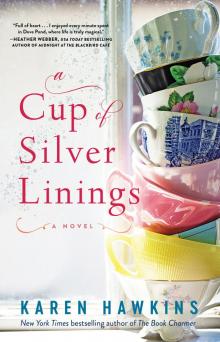 A Cup of Silver Linings
A Cup of Silver Linings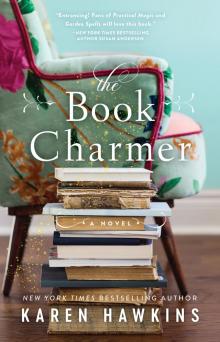 The Book Charmer
The Book Charmer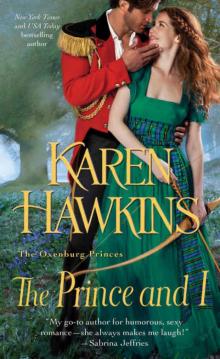 The Prince and I
The Prince and I![Duchess Diaries [2] How to Pursue a Princess Read online](http://i1.bookreadfree.com/i/03/12/duchess_diaries_[2]_how_to_pursue_a_princess_preview.jpg) Duchess Diaries [2] How to Pursue a Princess
Duchess Diaries [2] How to Pursue a Princess To Scotland, With Love
To Scotland, With Love Her Master and Commander
Her Master and Commander A Belated Bride
A Belated Bride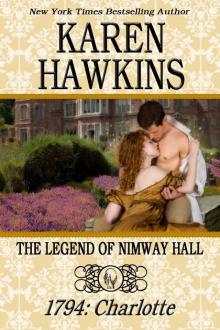 1794_Charlotte
1794_Charlotte The Abduction of Julia
The Abduction of Julia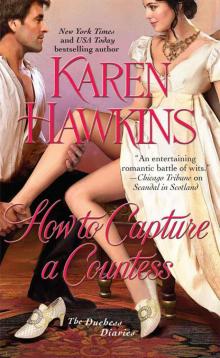 How to Capture a Countess (Duchess Diaries 1)
How to Capture a Countess (Duchess Diaries 1)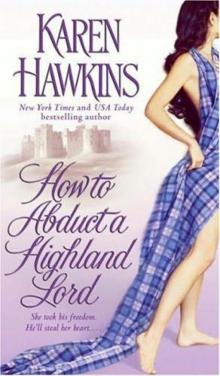 Karen Hawkins - MacLean 1 How to Abduct a Highland Lord
Karen Hawkins - MacLean 1 How to Abduct a Highland Lord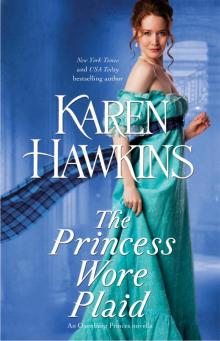 The Princess Wore Plaid
The Princess Wore Plaid How to Abduct a Highland Lord
How to Abduct a Highland Lord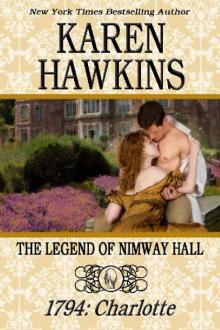 THE LEGEND OF NIMWAY HALL: 1794 - CHARLOTTE
THE LEGEND OF NIMWAY HALL: 1794 - CHARLOTTE Caught by the Scot
Caught by the Scot The Lady in the Tower
The Lady in the Tower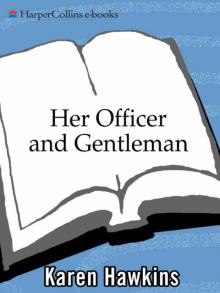 Her Officer and Gentleman
Her Officer and Gentleman Hurst 02 - Scandal in Scotland
Hurst 02 - Scandal in Scotland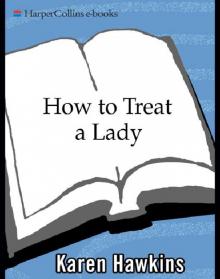 How to Treat a Lady
How to Treat a Lady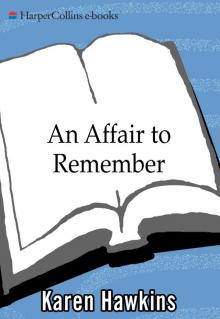 An Affair to Remember
An Affair to Remember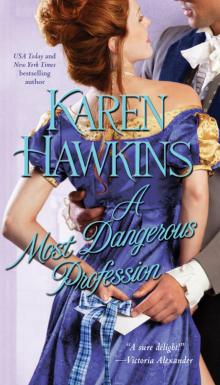 A Most Dangerous Profession
A Most Dangerous Profession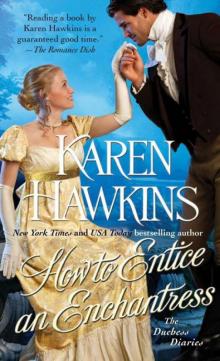 How to Entice an Enchantress
How to Entice an Enchantress The MacLeans: Sleepless in Scotland
The MacLeans: Sleepless in Scotland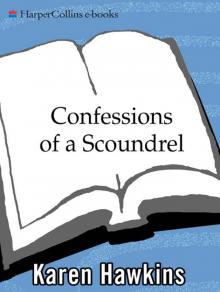 Confessions of a Scoundrel
Confessions of a Scoundrel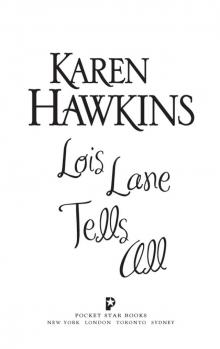 Lois Lane Tells All
Lois Lane Tells All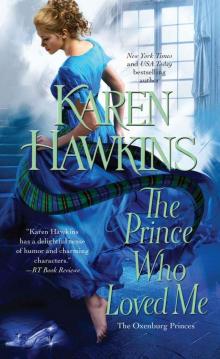 The Prince Who Loved Me (The Oxenburg Princes)
The Prince Who Loved Me (The Oxenburg Princes) The Seduction of Sara
The Seduction of Sara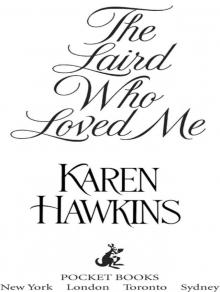 The Laird Who Loved Me
The Laird Who Loved Me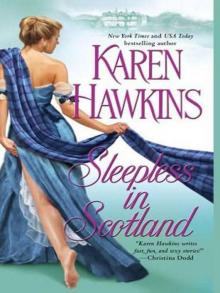 The MacLeans - Sleepless in Scotla
The MacLeans - Sleepless in Scotla And the Bride Wore Plaid
And the Bride Wore Plaid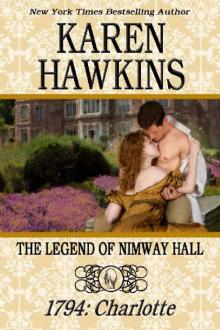 THE LEGEND OF NIMWAY HALL_1794_CHARLOTTE
THE LEGEND OF NIMWAY HALL_1794_CHARLOTTE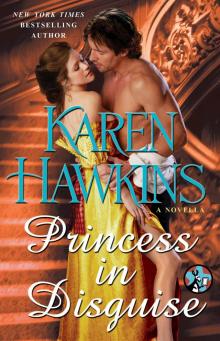 Princess in Disguise
Princess in Disguise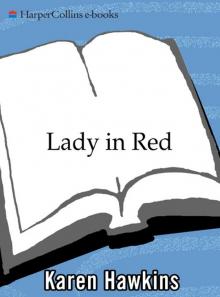 Lady in Red
Lady in Red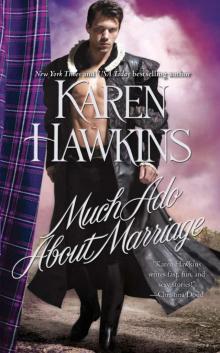 Much Ado About Marriage
Much Ado About Marriage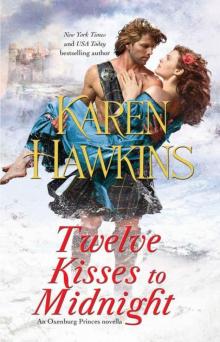 Twelve Kisses to Midnight: A Novella (The Oxenburg Princes)
Twelve Kisses to Midnight: A Novella (The Oxenburg Princes) Mad for the Plaid
Mad for the Plaid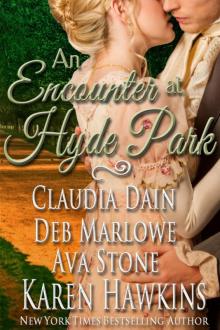 An Encounter at Hyde Park
An Encounter at Hyde Park